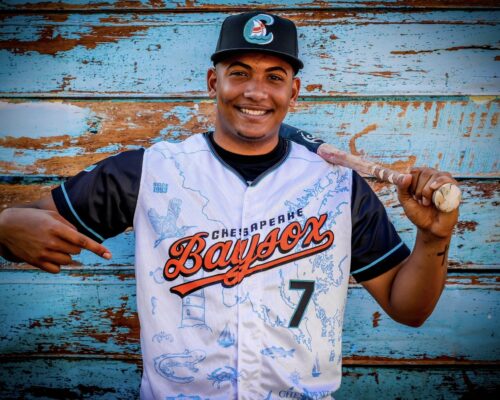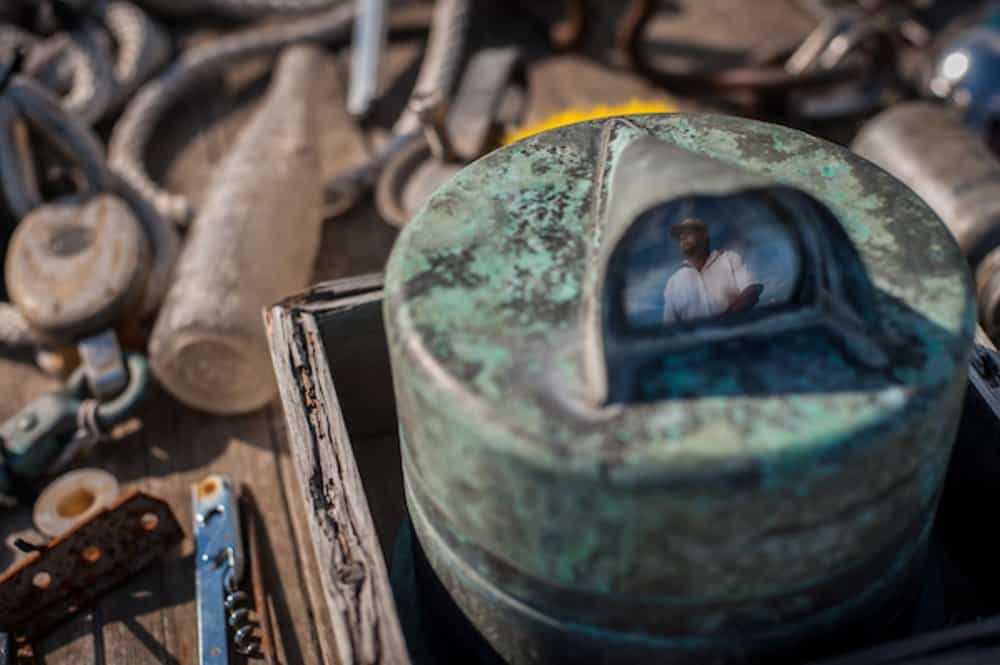“I ’ve got some great friends,” says Willie Crockett from his second-story studio in Onancock, Va., where numerous paintings in various stages of completion surround him. “For the last seventeen years, a group of about eight of us have met on Sunday mornings to tell stories and have a few laughs. It gets the week off to a good start. I also play poker with the same guys each week. I don’t hunt as much as I used to since I sold my cabin, but I still take a hunting trip once a year with some old friends. I keep my boat at the dock and go fishing when they’re biting. My wife says, ‘All you do is have fun.’ The other night I was dreaming and woke up laughing at something one of my friends said. She wakes up and says, ‘Why, you even have fun in your sleep.’ ”
Crockett also has fun when he works. “I love coming here every day,” looking over at Chamois, a 13-year-old yellow Lab who sleeps at his feet while he paints. “People ask me when I’m going to retire. I say, ‘Retire from what?’ ”
Crockett, one of the best-known artists on the Eastern Shore of Virginia, grew up on Tangier Island, the son of a waterman who also served as a church elder and minister. “I found I enjoyed playing on the water more than I like working on the water,” he says. “My father always said, ‘You’re too light for heavy work and too heavy for light work.’ ”
Crockett’s best memories of growing up on Tangier were of the times listening to the stories of the old men on the docks and in the general store. “Tangiermen are great story tellers,” says Crockett. The skill was not lost on Crockett. When Crockett was in the fifth grade, his teacher asked the class to put their heads on their desks and close their eyes while she read Thomas Gray’s 1751 poem Elegy Written in a Country Churchyard.
“I couldn’t believe someone could write those words,” says Crockett as he recites a passage. “I loved poetry from that day on. I took to memorizing poetry on our trips across the Bay to Crisfield to sell what we caught.”
After high school, Crockett attended bible college in Columbia, S.C., and, after returning to the island for a year to teach elementary school, he headed west to Oregon and Washington where he was a minister for seven years. “I tried to convert the hippies, and they liberated me,” says Crockett. “When I knew I no longer wanted to be a minister, I had to learn a skill unless I wanted to join the rat race.” While out west, he took art classes from an older man. “I was good at drawing things, but he taught me to be an artist.”

Crockett returned to the Eastern Shore but stayed on the mainland rather than his native Tangier. His watercolors of hunting scenes, old boats and local wharves were in great demand by the public in an era when wildlife art exploded on the scene. His paintings brought unheard of prices at the time at Ducks Unlimited banquets. He has donated to numerous non-profits over the years.
He taught art classes and produced a new wave of wildlife artists, many of whom have prospered. “Some of them are charging more than me,” says Crockett with a touch of pride. Sometimes Crockett barters with his customers rather than charges. “I’ve traded paintings for services from doctors, lawyers, dentists, you name it.” In many places, a mural by Crockett will span a wall. Recently, he has taken to painting scenes on an unfinished door, which serves as a large canvas for his work. He also works with oils and acrylics.
Crockett has held Shakespearean readings at local venues. “Not many people have heard a Tangierman doing Shakespeare,” says Crockett with his ever-ready smile. He’s in the process of developing a book that will include his artwork and original poetry, which reflects his love of the outdoors.
Always a jokester, Crockett says with dead seriousness, “I married well,” referring to Iris, his wife of 54 years, who runs a successful Onancock-based real estate business from an historic Onancock building. They have five children, including Billy who has won acclaim at the Ward World Carving Championship. “He has talent, but he also loves what he does,” says a proud father.
“You have to love what you’re doing to be any good at it,” says Crockett. “When people tell me I’ve been blessed to have a talent, like I was chosen to do this, I say, ‘I deserve some of the credit. You should see the 10 million sheets of paper I crumpled and threw away.’ ”
—Bill Sterling



